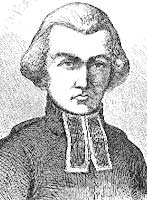Étienne-Alexandre Bernier: Difference between revisions
m refine cat |
No edit summary Tags: Mobile edit Mobile web edit |
||
| (20 intermediate revisions by 19 users not shown) | |||
| Line 1: | Line 1: | ||
{{Use dmy dates|date=January 2023}} |
|||
[[Image:Étienne-Alexandre Bernier.jpg|right|thumb|Étienne-Alexandre Bernier]] |
[[Image:Étienne-Alexandre Bernier.jpg|right|thumb|Étienne-Alexandre Bernier]] |
||
'''Étienne-Alexandre Bernier''' or ''[[Abbé]] Bernier'' ( |
'''Étienne-Alexandre Bernier''' or ''[[Abbé]] Bernier'' ({{IPA|fr|etjɛn alɛksɑ̃dʁ bɛʁnje}}; 31 October 1762 – 1 October 1806) was a French religious figure and [[House of Bourbon|Royalist]] politician during the [[French Revolution]]. |
||
Born in [[Daon]], Bernier was a professor of [[theology]] at the [[University of Angers]] and a [[vicar]] in the city of [[Angers]]. He refused to take the [[Civil Constitution of the Clergy|Civil Oath]] demanded by the Revolution, and, in |
Born in [[Daon, Mayenne]], Bernier was a professor of [[theology]] at the [[University of Angers]] and a [[vicar]] in the city of [[Angers]]. He refused to take the [[Civil Constitution of the Clergy|Civil Oath]] demanded by the Revolution, and, in 1793, joined the [[Revolt in the Vendée]], and, for a while, was its leader alongside [[Jean-Nicolas Stofflet]]. He negotiated the peace with [[French Revolutionary Army]] General [[Lazare Hoche]], and worked to have the [[Vendée]] pacified. |
||
Under [[Napoleon |
Under [[Napoleon]] Bonaparte, Bernier was assigned to negotiate the [[Separation of church and state|unification of nation and church]] in France with the [[Pope|Papal]] delegation of [[Pope Pius VII|Pius VII]]. After successful completion of the [[Concordat of 1801|1801 Concordat]], he was named [[Bishop of Orléans]] by Napoleon in 1802. |
||
He died in [[Paris]]. |
He died in [[Paris]]. |
||
| Line 13: | Line 14: | ||
==External links== |
==External links== |
||
*[http://www.newadvent.org/cathen/02509b.htm ''Catholic Encyclopedia'' entry] |
*[http://www.newadvent.org/cathen/02509b.htm ''Catholic Encyclopedia'' entry] |
||
{{Authority control}} |
|||
{{DEFAULTSORT:Bernier, Etienne-Alexandre}} |
{{DEFAULTSORT:Bernier, Etienne-Alexandre}} |
||
| ⚫ | |||
| ⚫ | |||
| ⚫ | |||
| ⚫ | |||
[[Category:1764 births]] |
[[Category:1764 births]] |
||
[[Category:1806 deaths]] |
[[Category:1806 deaths]] |
||
| ⚫ | |||
| ⚫ | |||
[[fr:Étienne-Alexandre Bernier]] |
|||
[[Category:Academic staff of the University of Angers (pre-1793)]] |
|||
[[it:Étienne-Alexandre Bernier]] |
|||
| ⚫ | |||
[[ja:エティエンヌ=アレクサンドル・ベルニエ]] |
|||
| ⚫ | |||
Latest revision as of 20:02, 26 July 2024

Étienne-Alexandre Bernier or Abbé Bernier (French pronunciation: [etjɛn alɛksɑ̃dʁ bɛʁnje]; 31 October 1762 – 1 October 1806) was a French religious figure and Royalist politician during the French Revolution.
Born in Daon, Mayenne, Bernier was a professor of theology at the University of Angers and a vicar in the city of Angers. He refused to take the Civil Oath demanded by the Revolution, and, in 1793, joined the Revolt in the Vendée, and, for a while, was its leader alongside Jean-Nicolas Stofflet. He negotiated the peace with French Revolutionary Army General Lazare Hoche, and worked to have the Vendée pacified.
Under Napoleon Bonaparte, Bernier was assigned to negotiate the unification of nation and church in France with the Papal delegation of Pius VII. After successful completion of the 1801 Concordat, he was named Bishop of Orléans by Napoleon in 1802.
He died in Paris.
References
[edit]- Dictionnaire Bouillet (1869)
